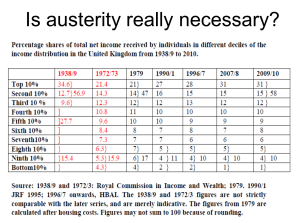Today sees the publication of a National Audit Office report into Universal Credit. Many of the morning’s newspapers are carrying this story and, earlier this week, the Telegraph featured an interview with Howard Shiplee, the Director-General for Universal Credit in which he acknowledged there had been a number of ‘missteps’ alog the way. This contrasts with earlier public statements by the likes of Iain Duncan Smith and David Cameron who have previously failed to acknowledge any difficulties. The Prime Minister, in November last year, apparently told Parliament that ‘Universal Credit is on time and on budget’.
There is already lots of media coverage around this issue so I’ll try not to repeat much of it, but a couple of lines in an article in The Guardian yesterday caught my attention. Here they are:
The DWP said it was misleading to characterise money already spent as having gone to waste. “No one has said we’re starting again … we’re looking at enhancing not replacing [systems],” it said.
It said it did not recognise the £350m figure being lost in savings due to the slower roll out of the programme.
A DWP spokesperson later added: “The early roll-out of Universal Credit is allowing us to develop the new benefit in a safe and controlled way. This is the responsible approach.
I thought this was really interesting because the current government have always been very quick to dismiss the child poverty approach of the previous government as a waste of money. Look at the following quotes from the foreword,(written by Iain Duncan Smith) to the government’s Child Poverty Strategy:
Good intentions failed to translate into effective policies.
By transferring cash to make good on short-term relative income effects they entrenched benefit dependency, delivering both poor outcomes for society and a poor return for the taxpayer
Limited social returns were delivered despite significant income transfers
With a focus on fairness and personal responsibility, not cash handouts, this is the responsible choice in this fiscal climate.
we believe that the aims of the Child Poverty Act – to dramatically reduce levels of child poverty in the UK – will not be achieved through simply throwing money at the perceived symptoms. This approach has been exhausted, not only failing to turn the tide on income poverty, but worse still, exacerbating the problem by suppressing incentives to work and keeping families in cycles of entrenched deprivation.
It is now more important than ever to secure optimum returns on investment spending.
Just to put things into a bit of context, the last government missed their own target of cutting child poverty by half by 2010-11. However, during their term of office they still managed to reduce the number of children living in poverty by around 1 million, which, as a taxpayer, I would like to suggest was not a ‘poor return’ and nor do I believe that the last government ‘simply threw money’ at the problem. The current government, on the other hand, are likely to preside over an increase in the numbers of children living in poverty to 2015-16, the term of this parliament, of around 300,000, and it is predicted that the ‘direct impact of the current government’s announced reforms to personal tax and benefit policy will be to increase relative poverty among children by 200,000’
The point I’m trying to emphasise is that, when it suits them, this government (perhaps all politicians) are more than happy to characterise something that was making (slower than expected) progress as an ‘exhausted’ approach that failed and actually made things worse. But, when the shoe is on the other foot and something stands accused of not making planned progress, it is characterised as developing in a ‘safe and controlled way’ and the ‘responsible approach’ is to stick with it. In fact, the Press Release of the report by the NAO contains a section which, whilst focusing on Universal Credit, could easily be taken to represent the current approach to tackling poverty
The Department took risks to try to meet the short timescale and used a new project management approach which it had never before used on a programme of this size and complexity. It was unable to explain how it originally decided on its ambitious plans or evaluated their feasibility.
But then, belief, not evidence, is what it’s all about……
Best wishes,
Steve









Family Support and Child Poverty
Steve Crossley, freshly released from the burden of responsibility for this blog, has penned a readable report on the role of Family Support in addressing Child Poverty: ‘Family support’ and child poverty.
Based on a review of available evaluation evidence, Steve concludes that family support projects, while important for helping families, are NOT a way of tackling child poverty, because while they tackle some issues caused or exacerbated by poverty, but do not tackle the causes of that poverty. He points out that the scale of resources invested in supporting families is dwarfed by the resources that are being taken away from families through welfare reform, cuts to public services and falling real wages.
Share this:
Leave a comment | posted in child poverty, comment, in-work poverty, Troubled families